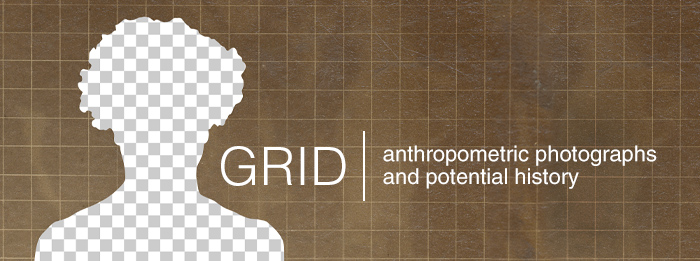
Exhibition at the Royal Anthropological Institute, 50 Fitzroy St., London W1T 5BT
11 September – 14 October 2023
In the mid-nineteenth century, the emerging field of study of anthropology eagerly embraced the equally new practice of photography as a tool for a total survey of its subjects. The individuals captured in these photographs were profoundly entangled within an exploitative, marginalizing political and economic context and interactions with photographers were very often part of the colonial encounter. The practice of anthropometry used photography to mimic scientific representation by isolating subjects against plain backgrounds or using grids in order to superficially measure physical characteristics. These images were then integrated into the pseudo-scientific project of classifying people according to racial categories.
In recent decades, contemporary anthropologists have turned their attention to the colonial archive questioning its affordances at this moment in time. These explorations shifted the discipline’s methodology from a perspective of “reading” photographs as documents, in order to extract historical information, to a more comprehensive approach that understands how photographs embody political consciousness not only the context in which they have been created but also the places they currently inhabit.
This project advocates for considering the subjects of these images as active participants in contemporary discussions about the archive, its use, and the responsibilities tied to the knowledge production process embedded within the archive. It also aspires to encourage further investigations on how these images can contribute to a process of political emancipation that transcends temporal, spatial, or any other forms of separation.
Azoulay theorizes photography as a source of potential history. She argues that the shutter draws three dividing lines: in time (between a before and an after), in space (between who/what is in front of the camera and who/what is behind it), and in the body politic (between those who possess and operate such devices and appropriate and accumulate their product and those whose countenance, resources, or labour are extracted).
Everything is done to make sure that those affected by the shutter will no longer be able to come together with the others the shutter has confined to other spaces and well-differentiated categories.
Today, contemporary anthropology works to close this gap of confinement. This approach rejects the rhythm of the shutter that generated endless separations and infinitely missed encounters. It’s an attempt to engage with those relegated to the “past” not as “primary sources” but rather as potential companions. As Azoulay puts it, “Potential history is a form of being with others, both living and dead, across time, against the separation of the past from the present, colonized peoples from their worlds and possessions, and history from politics.“
By bringing all these people together, into the present, a collective subjectivity outside the grid is constituted. This means connecting what anthropometric photography fundamentally separates, bridging the normalized split between “others” dispossessed by imperialism and the materialization (in institutions and infra/structures) of the imperialist mechanism of splitting that indiscriminately possesses our world.
This is an artistic project by Andrei Nacu (www.andreinacu.ro), currently RAI’s photo curator and archivist. It represents an artistic attempt to explore the subjectivity of those who work and care for these colonial images.
A project initiated by ElectroPutere Gallery (www.electro-putere.com). Cultural project co-financed by the Romanian National Cultural Fund Administration. The project does not necessarily represent the position of the Administration of the National Cultural Fund or of the Royal Anthropological Institute. AFCN is not responsible for the content of the project or the manner in which the results of the project may be used. These are entirely the responsibility of the funding recipient.
Viewing of the exhibition is by appointment only. Please contact us on info@therai.org.uk to book.

